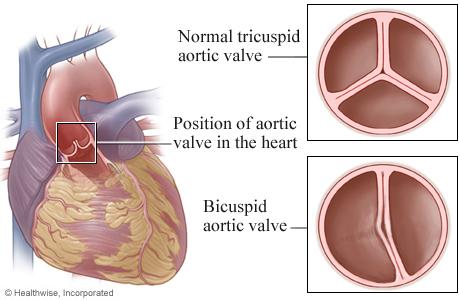
Bicuspid aortic valve (BAV) is a genetic condition that causes the aortic valve to have two leaflets instead of three. It’s the most common type of congenital heart disease (heart defect that’s present at birth) and often goes unnoticed until later in life.
Doctors at the Frankel Cardiovascular Center’s Comprehensive Aortic Program have extensive experience treating patients with bicuspid aortic valve disease. We also coordinate with our Adult Congenital Heart Disease Program. Together, we offer patients expert treatment and long-term monitoring.
Bicuspid Aortic Valve Care at the Frankel Cardiovascular Center
Our world class cardiovascular specialists are dedicated to protecting your health. Highlights of our programs include:
- National recognition: Our cardiovascular program is among the best in the nation, ranking 20th for cardiology and heart surgery by U.S. News and World Report. And since 2017 we have been accredited by the Adult Congenital Heart Association as a Comprehensive Care Center.
- Innovation: Our doctors are on the forefront of the latest cardiovascular treatments. We are often involved in developing new models of care to improve patient outcomes.
- Clinical trials: We participate in numerous major clinical trials. You’ll benefit from access to treatments and newest generation valves not available elsewhere.
- Advanced research: Our research teams are active in learning more about bicuspid aortic valve and what causes it. We aim to provide better care and treatments that help patients lead long, full lives.
- Convenient care: You’ll find aortic valve specialists and adult congenital heart specialists under one roof. This makes it easy for our team to collaborate and coordinate your care. It’s also convenient for you to schedule appointments and diagnostic testing on the same day.
Causes of Bicuspid Aortic Valve
Approximately 1% to 2% of the population have BAV. It is twice as common in males.
Researchers are not sure what causes BAV, but they believe it is inherited. Bicuspid aortic valve is also associated with genetic connective tissue disorders such as Marfan syndrome and Loeys-Dietz syndrome. Read more about aortic-related connective tissue disorders.
Symptoms of Bicuspid Aortic Valve
Though present from birth, most people with BAV are unaware of the condition and do not have any symptoms.
A BAV may leak due to regurgitation or become narrow due to stenosis. Then symptoms such as chest pain and shortness of breath may occur. Regurgitation and stenosis require the heart to work harder to pump blood and can cause heart failure.
Patients with BAV may also have an enlarged aorta. This can lead to aortic aneurysms or aortic dissections that can be life-threatening if they rupture.
Diagnosing Bicuspid Aortic Valve
A heart murmur is often the first sign of heart valve disease. This is a whooshing sound your doctor hears when listening to your heart with a stethoscope.
If a murmur is detected, your doctor will order an echocardiogram (ultrasound image of the heart) to see the action of your heart and valves. If you have a BAV, your doctor may order additional tests to check your aorta.
Treating Bicuspid Aortic Valve
Treatment depends on your symptoms and progress of the disease. Your doctor may recommend monitoring and medications to reduce blood pressure or treat other heart conditions.
Our congenital heart disease specialists will track your condition to identify any changes early. Close follow-up care is important to protect your heart and prevent a life-threatening condition.
For more severe valve disease, you may need a minimally invasive procedure or open-heart surgery to replace or repair your aortic valve. If you have an enlarged aorta or indication of an aneurysm or dissection, your doctor will also recommend treating that condition. Read more about aortic disease treatments and procedures.
Bicuspid Aortic Valve Research
Frankel Cardiovascular Center researchers maintain a registry of patients with BAV. This project tracks patterns of patient outcomes and responses to medical therapy. Find out more about the Bicuspid Aortic Valve Disease Registry.
We also include patients with BAV in our Cardiovascular Health Improvement Project (CHIP) study. In this study, researchers collect and analyze blood and clinical data from patients with several cardiovascular conditions. Our goal is to find genetic causes of these conditions and identify new treatments.
Make an Appointment
To schedule an evaluation with a Frankel Cardiovascular Center physician, call 888-287-1082. Or visit the Make a Cardiovascular Appointment page to learn what to expect when you call us.
Physicians: To refer a patient, call M-Line at 800-962-3555.

